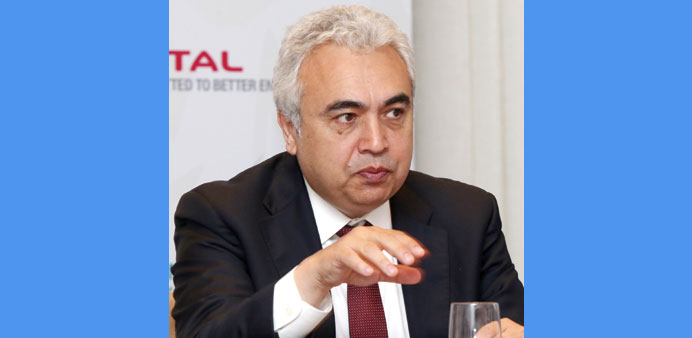By Pratap John/Chief Business Reporter
The investment in the upstream oil sector is expected to be 19% lower this year compared with 2014, according to Dr Fatih Birol, chief economist at the International Energy Agency (IEA) in Paris.
“This is a drop in excess of $100bn, globally, and a big portion of this occurred in North America. This is clearly because of the decline in oil price,” Birol told Gulf Times here yesterday. “We have never seen such a big drop even in times of financial crises.”
But, according to Birol, it is unlikely that the oil price would again drop to $45 a barrel or less anytime soon.
Early this year, oil fell below $45 a barrel amid speculation that US stockpiles will increase, exacerbating a global supply glut that’s driven prices to the lowest in more than five and a half years.
“At Davos and many other international fora, the main topic of the discussion was the oil price at $45 or less. Many industry leaders have said we will not see oil at $60 for two to three years. But they were proved wrong,” Birol said citing the oil price on May 5.
Prices climbed back above $60 a barrel as the US trade deficit jumped to a six-year high, sparking concern about economic growth.
On why oil price would not slide to $45 in the near term, Birol said, “Besides the estimated lower investments in the upstream oil sector this year, key economies are showing some positive signs. US economy is doing well. Assumption is that European economy may do better than expected. And if China and the rest of Asia perform above 7% (real GDP growth), we may well see slightly strong demand growth this year compared to 2014.”
Nonetheless, the IEA’s top economist said the oil price would “come under pressure” if Europe and other countries face sluggish economic growth.
“On top of these are geopolitical risks. These are difficult to forecast. Iraq, Syria, Libya and the issues between Iran and the international community are all factors that will have implications on the oil price,” Birol pointed out.
On Tuesday night Birol was honoured with the Abdullah bin Hamad al-Attiyah Energy Award in Doha for his lifetime commitment to the producer–consumer dialogue as the chief Economist of the IEA and formerly with the Organisation of Petroleum Exporting Countries.
He is responsible for the IEA’s flagship World Energy Outlook (WEO) publication, which has been recognised as the “most authoritative source of strategic analysis” of global energy markets.
The executive director-elect of the International Energy, Birol has been named by Forbes Magazine among the most powerful people in terms of influence on the world’s energy scene.

Dr Fatih Birol at a media roundtable in Doha yesterday. PICTURE: Jayan Orma
